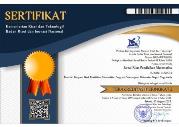PENGEMBANGAN PERANGKAT PEMBELAJARAN MATEMATIKA SMP DENGAN METODE INKUIRI PADA PERSAMAAN DAN PERTIDAKSAMAAN LINEAR SATU VARIABEL
DOI:
https://doi.org/10.21831/jrpm.v2i1.7149Keywords:
pengembangan, perangkat pembelajaran, inkuiriAbstract
Tujuan penelitian ini menghasilkan perangkat pembelajaran matematika dengan metode inkuiri pada persamaan dan pertidaksamaan linear satu variabel, dengan kriteria valid, praktis, dan efektif ditinjau dari prestasi dan kepercayaan diri siswa. Jenis penelitian ini adalah penelitian pengembangan. Model pengembangan diadaptasi dari model pengembangan Reiser & Dempsey. Pengembangan terdiri dari lima tahap yaitu analisis, desain, pengembangan, implementasi, dan evaluasi. Penelitian ini menghasilkan perangkat pembelajaran yang terdiri dari silabus, RPP, LAS, dan tes ulangan harian. Hasil penelitian menunjukkan bahwa perangkat pembelajaran memenuhi kriteria valid, praktis, dan efektif. Kevalidan produk pengembangan ditentukan oleh validasi ahli, kepraktisan produk pengem-bangan ditentukan oleh penilaian guru, dan siswa, sedangkan keefektifan produk pengembangan ditinjau dari prestasi dan kepercayaan diri siswa. Prestasi yang dicapai siswa mencapai rata-rata 76,94 melampaui KKM yakni 70, sedangkan kepercayaan diri siswa dari 55,88% menjadi 82,35% pada kategori minimal baik.
Kata Kunci: pengembangan, perangkat pembelajaran, inkuiri
DEVELOPING LEARNING MATERIALS MATHEMATICS WITH INQUIRY METHOD FOR EQUATIONS LINEAR AND INEQUALITY OF ONE VARIABLE
Abstract
The aim of this study produces mathematics instructional materials, on linear equations and inequalities one variable with inquiry methods that valid, practical, and effective criteria in terms of student achievement and self-confidence. This study is developmental research. It is adapted from Reiser & Dempsey models. The research through several phases: analysis, design, development, implementation, and evaluation. The instructional materials is consists of syllabi, lesson plans, student sheet activity, and daily tests. The results showed that is the valid criteria valid, practical, and effective. Validity of development product is determined by the expert validation, the practicality is determined by the assessment of teachers, and students, while the effectiveness in terms of student achievement and self-confidence. Achievements of students achieving an average of 76.9412 beyond the KKM 70, while the confidence of students from 55.88% to 82.35% on minimal good category.
Keywords: development, learning instructional materials, inquiry
References
Ajzen, I. (2005). Attitudes, personality and behavior (2nd ed.). New York: Open University Press
Azwar, S. (2010). Tes prestasi (2nd ed). Yogyakarta: Pustaka Pelajar
Coffman, T. (2009). Engaging students through inquiry-oriented learning and technology. Plymouth: The Rowman & Littlefield Publishing Group, Inc.
Depdikbud. (2013).Permendikbud No 65: tentang standar proses pendidikan dasar dan menengah. Jakarta: Depdikbud
Druckman, D., Bjork R A.(1994) Learning, remembering, believing, Washington, D.C.: National Academy of Science
Ellis, A. K.(2010). Teaching and learning elementary social studies. Boston: Pearson Education, Inc.
Eynde, P. O., De Corte, E., & Verschaffel, L. (2003). Framing students' mathematics related beliefs. Dalam G. C. Leder, E. Pehkonen, & G. Toner (Eds.), Beliefs: A Hidden Variable in Mathematics Education? (pp 13-37). New York: Kluwer Academic Publisher
Goos, M., Stillman, G., & Vale, C. (2007). Teaching secondary school mathematics: research and practice for the 21st century.
Haylock, D.& Thangata, F., (2007). Key concepts in teaching primary mathe-matics. London: SAGE Publications Ltd
Jalongo, M. R., Rieg, S. A., & Helterbran, V. R. (2007). Planning for learning: collaborative approaches to lesson design and review. New York: Teachers College Press
Jurdak, M.,(2009). Toward equity in quality in mathematics education. New York: Springer.
Kennedy, L. M., Tipps S., Johnson A.,(2008). Guiding children's learning of mathematics, Eleventh Edition. Belmont: Thomson Higher Education
Kyriacou, C.,(2009). Effective teaching in schools theory and practice (3rd ed) Edition. Cheltenham: Nelson Thornes Ltd.
Llewellyn, D.J., (2011). Differentiated science inquiry. California: SAGE Company
Middleton, J. A., Spanias P. A. (1999). Motivation for achievement in mathematics: finding, generalization, and criticism of the research. Journal for research in Mathematics Education, 30, 65
Moore, K. D., (2009). Effective insructional strategies: from theory to practice. London: SAGE Publication, Inc -68.
National Council of Teacher Mathematics (2000). Principles and standards for school mathematics. Reston: Library of Congress.
Nitko, A.J., Brookhart, S.M.,(2011). Educational assessment of studens. Boston: Allyn & Bacon (Pearson Education, Inc.)
Nieveen, N. (2010). Formative Evaluation in Educational Design Research Dalam Plomp T & Nieveen, N(eds). An Intruction to Educational. Natherland : Slo
Ollerton, M., (2009). The mathematics teacher's handbook. New York: Continuum International
Preston, D. L.,(2007). 365 steps to self-confidence. Begbroke. UK British Library Cataloguing.
Reiser, R. A., Dempsey, J. V. (2007). Trend and issues in instructional design and technology. New Jersey: Pearson Merrill Prentice Hall
Spronken-Smith et al.(2007). How effective is inquiry-based learning in linking teaching and research (Paper prepared for An International Colloquium on International Policies and Practices for Academic Enquiry) . Winchester,
Stephen, L.J., (1998). Theory and problems of beginning statistics. New York: Mc. Graw-Hill
Stronge, James H., (2007). Qualities of effective teachers (2nd ed). Beauregard St. Alexandria: Association for Supervision and Curriculum Development.
Vajoczki, S et.al,. (2011). Inquiry Learning: Level, Discipline, Class Size, What Matters?: International Journal for the Scholarship of Teaching and Learning. Vol. 5, No. 1. Ontario: Georgia Southern University
Van de Walle , J. A. (2007). Elementary and middle school mathematics: teaching developmentally. Boston: Pearson Education, Inc.
Ward-Penny, R.(2011). Cross-curricular teaching and learning in secondary education mathematics. New York: Routledge.
Yoder, J. M. D. & Proctor, W. (1998). The self-confidence child. San Francisco: Library of Congress
Zimmerman, B. J., Bonner, S., & Kovach, R. (1996). Developing self-regulated leamers: Beyond achievement to self-efficacy. Washington, DC: American Psychological Asocialion
Downloads
Published
How to Cite
Issue
Section
License

Jurnal Riset Pendidikan Matematika by http://journal.uny.ac.id/index.php/jrpm/index is licensed under a Creative Commons Attribution-ShareAlike 4.0 International License.









